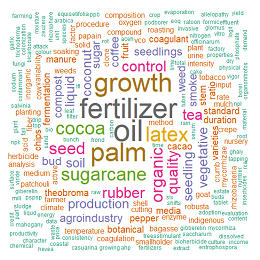Eksistensi Bisnis Agroindustri Teh Iroet
DOI:
https://doi.org/10.25181/jaip.v6i1.777Abstract
KSU Putera Mekar is the first cooperative to own a tea processing factory directly managed by smallholder tea farmers and produce dried tea products called Iroet tea. The beginning of Iroet Tea factory, they sell their products to PT Sariwangi AEA (Agricultural Estate Agency) and other small companies such as Agriwangi and Elinkindo, but it does not go long. PT Sariwangi broke his contract with the cooperative so that the cooperative did not have a large customer anymore. Cooperative members are decreasing because the cooperative is unable to absorb wet tea tops from farmers and can not afford to pay farmers with pay-weight system, but the agro-industry business still survives. This makes the cooperative requires the chronological know the main cause of bad business cooperatives and the reasons for cooperatives to survive. The research design used in this research is qualitative with case study technique. The method used in this research is descriptive qualitative. The results showed that the main cause of bad business cooperatives is the loss of large consumers and the absence of bailout funds. The reason for the cooperative still persists to this day because the cooperative management has a good orientation to improve the business of Iroet tea agroindustry, supported by the loyalty of cooperative members.  Keywords: agroindustry, cooperatives, loyalty, smallholder tea farmerDownloads
References
Anggraini, Q. D., Haryono, H., & Aksioma, D. F. (2016). Pengendalian kualitas proses produksi teh hitam di PT. Perkebunan Nusantara XII Unit Sirah Kencong. Jurnal Sains dan Seni ITS, 5(2), 327-332.
Das, S., & Ghosh, B. C. (2018). Studies on different qualitative traits of green tea grown in nontraditional area processed by oven drying and microwave drying in different power levels. Research & Reviews: Journal of Food Science and Technology, 7(1), 9-15.
Deswati, D. A., & Maryam, Z. N. (2017). Antidiabetic mellitus activity of low grade black tea in alloxan induced male albino mice. Jurnal Penelitian Teh dan Kina, 19(2), 2018-214.
Direktorat Jenderal Perkebunan. (2015). Pedoman Penanganan Pascapanen Tanaman Teh. Kementerian Pertanian Republik Indonesia. Retrieved from http://pphpbun.ditjenbun.pertanian.go.id/uploads/download/1509349070.pdf
Garutkab. (2018). Potensi Perkebunan. Retrieved April 14, 2018, from http://www.garutkab.go.id/page/perkebunan/.
Kementerian Pertanian. (2016). Outlook Teh Tahun 2016.
Moleong, L. J. (2006) Metodologi penelitian Kualitatif. Bandung: PT Remaja Rosdakarya.
Mona, Q. T., Lestari, D. A. H., & Situmorang, S. (2014). Analisis pendapatan dan tingkat kesejahteraan rumah tangga peternak sapi perah anggota Koperasi Peternakan Bandung Selatan (KPBS) Pangalengan. Jurnal Ilmu-Ilmu Agribisnis, 2(2), 109-117.
Rohdiana, D. (2015). Teh: proses, karakteristik dan komponen fungsionalnya. Food Review Indonesia, 10(8), 34-37.
Sugiarti, I., & Murti BS, S. H. (2017). Estimasi produksi teh menggunakan citra penginderaan jauh dan sistem informasi geografis di perkebunan Teh Kemuning tahun 2015. Jurnal Bumi Indonesia, 6(1), 1-9.
Sugiyono. (2012). Metode Penelitian Kuantitatif, Kualitatif dan R&D. Bandung: Alfabeta.
Sugiyono. (2013). Metode Penelitian Manajemen. Bandung: Alfabeta.
Susilo, E. (2013). Peran koperasi agribisnis dalam ketahanan pangan di Indonesia. Jurnal Dinamika Ekonomi & Bisnis, 10(1), 95-104.
Wibowo, A., & Ramadian, D. (2010). Model simulasi kinerja produksi teh untuk minimisasi work-in-process. Jurnal Optimasi Sistem Industri, 9(1), 7–12.
Downloads
Published
How to Cite
Issue
Section
License
Authors who publish with Jurnal Agro Industri Perkebunan agree to the following terms:
Authors retain copyright and grant the Jurnal Agro Industri Perkebunan right of first publication with the work simultaneously licensed under a Creative Commons Attribution License (CC BY-SA 4.0) that allows others to share (copy and redistribute the material in any medium or format) and adapt (remix, transform, and build upon the material for any purpose, even commercially) with an acknowledgment of the work's authorship and initial publication in Jurnal Agro Industri Perkebunan.
Authors are able to enter into separate, additional contractual arrangements for the non-exclusive distribution of the journal's published version of the work (e.g., post it to an institutional repository or publish it in a book), with an acknowledgment of its initial publication in Jurnal Agro Industri Perkebunan. Authors are permitted and encouraged to post their work online (e.g., in institutional repositories or on their website) prior to and during the submission process, as it can lead to productive exchanges, as well as earlier and greater citation of published work.


























